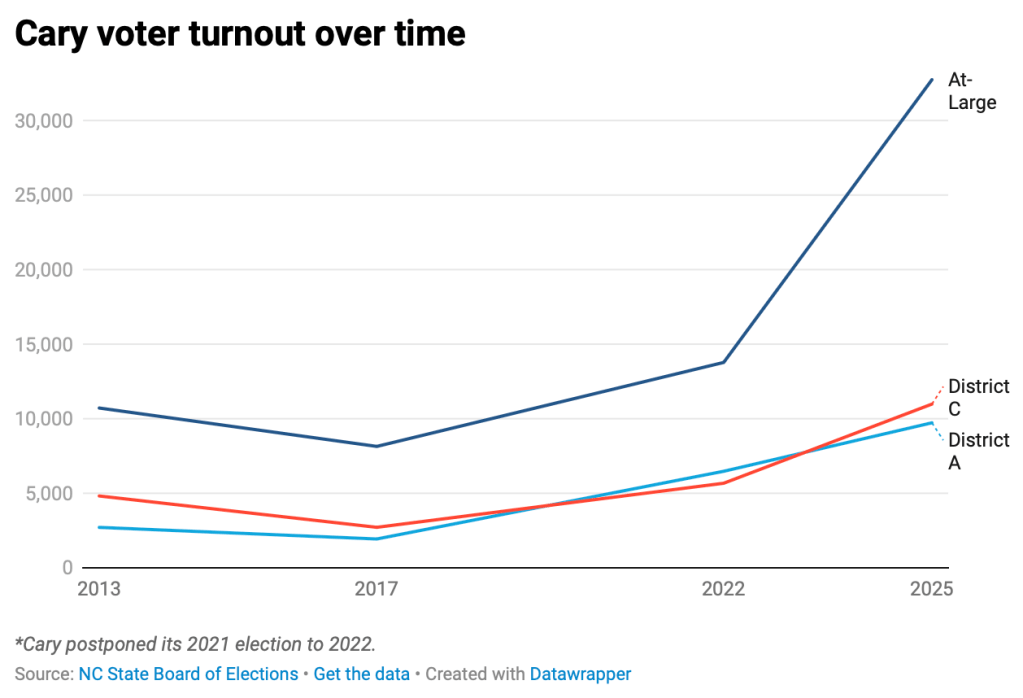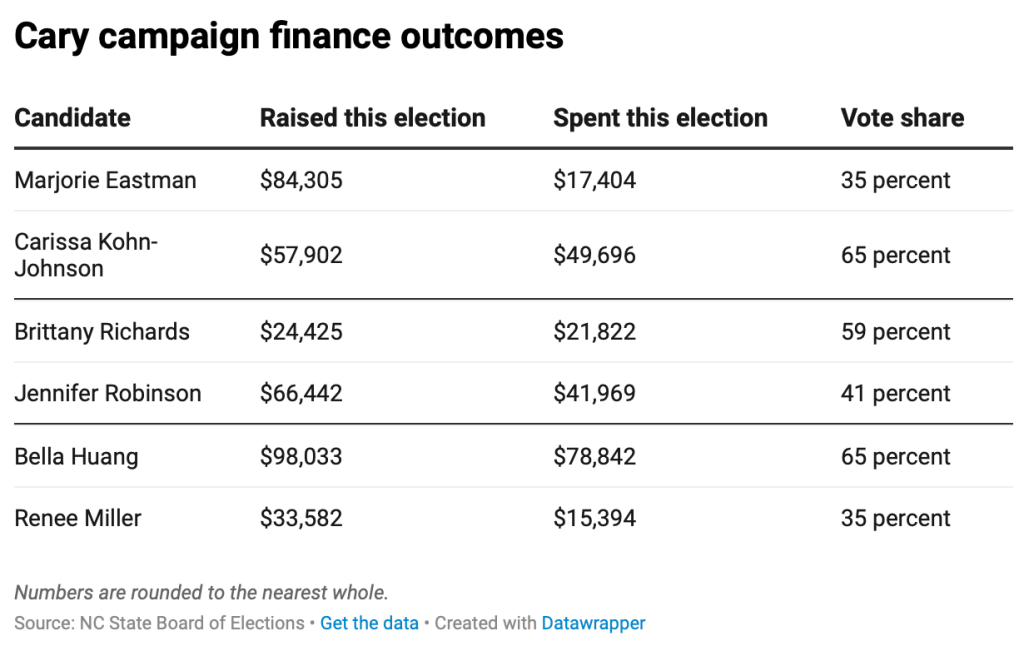On Tuesday, Cary voters elected three Democrats to the town council over their Republican opponents. Carissa Kohn-Johnson will continue as an at-large council member, and Brittany Richards and Bella Huang will take office in Districts A and C.
It was a lively, expensive election cycle that clarified what Caryites are looking for in their local leaders. Here are our takeaways from Tuesday’s results.
1. Democrats swept the board in these officially nonpartisan races.
None of the three Cary Republicans even came close to besting their Democratic counterparts. Kohn-Johnson defeated Marjorie Eastman by a 30-point margin in the at-large race. Huang also beat Renee Miller by 30 points in District C. And in District A, Richards defeated Jennifer Robinson, the incumbent, by 18 points.
It makes sense that the most competitive race of the night was between Richards and Robinson, who held office for 26 years and is the most moderate of the Republicans who ran. It’s possible that her association with two more vocally conservative, less-experienced candidates dragged her down: her loss stands out as particularly brutal considering she coasted to reelection in 2022 and 2017. Robinson didn’t adopt Eastman’s and Miller’s MAGA-tinged talking points, but the three candidates campaigned together and appeared side by side on the Wake GOP-endorsed slate.
“I had many people telling me that they had supported me in the past but would not vote for me this year for one reason: I am a registered Republican,” Robinson wrote in an Instagram post on Wednesday.
On a more granular level, the Cary Democrats look just as dominant as their top-line victories suggest: Huang beat Miller in every precinct, while Kohn-Johnson and Richards both won in all but two of their precincts.
Taken together, these unambiguous victories point to a successful organizing push by the Wake County Democratic Party (WCDP), which was very active in Cary this fall. At an Election Night watch party in Downtown Cary on Tuesday, Richards told a room full of WCDP volunteers that they collectively knocked on 4,000 doors ahead of the election. Kohn-Johnson also credited the Wake Dems for her win.
“This worked because we have really committed volunteers, but we also have paid staff. We need more paid staff,” she said Tuesday night. “So I’m going to work really hard …. What I’m going to start doing is raising money for Wake Dems. I just wanted to make a very public commitment to Wake Dems.”
The Democrats’ clean sweep fits into a trend that’s been unfolding in Cary for a few years now. In fact, once the newly elected council members are sworn in this December, the town council will be composed of all Democrats. That’s a major shift from just a few years ago, when the town council had a couple Republicans and a couple unaffiliated members who leaned to the right.
The sweep also fits into a broader pattern of Democratic victories across the county: WCDP-endorsed candidates defeated conservative or Republican incumbents in Holly Springs, Fuquay-Varina, and Wake Forest this year.
1.5. More voters showed up for these elections than usual.
Voter turnout exceeded past election cycles in all three Cary Town Council races. The at-large race saw the most dramatic jump, with about 32,700 people casting ballots this year compared to about 13,700 in 2022.
The high turnout could have something to do with the partisan nature of these contests—every candidate on the ballot was backed by the Wake Dems or Wake GOP, which provided resources and get-out-the-vote support. Back in May, WCDP chair Wesley Knott told the INDY he would be mobilizing volunteers across the county to knock on as many doors as humanly possible between Labor Day and Election Day.

2. Money mattered, but it wasn’t the best predictor of victory.
There wasn’t a clear correlation between candidates’ fundraising or spending and their final vote share. Huang and Kohn-Johnson outspent their opponents by wide margins, but Richards trailed behind Robinson on both fundraising and spending, and she still won her race with 59 percent of the vote.

Richards raised most of her money in small increments from local donors. Robinson also had a long donor list, but a big chunk of her cash came in the form of large donations from people in the real estate/development industry.
Huang, who cofounded a political action committee that raises money for local Asian American candidates, fundraised the most: 187 mostly local donors gave her about $524 each on average.
Eastman was the second-highest fundraiser out of the Cary candidates this election cycle though she didn’t spend much of her haul. Her average donation was about $760. Real estate–adjacent people donated to her campaign, but her top contributors were former council member Ken George ($6,000), his wife Karen George ($6,000), and Cary residents Charles Eastman ($6,800) and Colleen Baker ($6,800).
3. For a decade, the Cary Town Council barely changed. That’s over now.
Before the 2022 municipal elections, six of the Cary Town Council’s seven members had been in office for at least 10 years. Kohn-Johnson defeated an incumbent that year, and in 2023, two more new members (Michelle Craig and Sarika Bansal) joined. Now that Huang is replacing Jack Smith and Richards has defeated Robinson, relative newcomers will soon outnumber council veterans five to two.
Come December, mayor Harold Weinbrecht and at-large council member Lori Bush will be the longest-serving active town council members, with about 18 and 14 years under their respective belts. Kohn-Johsnon will be the next-most-experienced member as she begins her second term.
“New voices” was a theme of this campaign cycle, particularly for Richards, who believes hers is what gave her an edge over Robinson.
“The biggest dimension of my race was people craving a fresh voice after having had a longtime incumbent in office,” Richards told the INDY on Tuesday once she learned she’d won. “The results show that … there were folks in the community that appreciated my opponent’s service, as I have as well. But I had told people from the beginning that I was running not because she was ready to step down but because I was ready to step up.”
Huang also campaigned as a newcomer with a fresh perspective to bring to the town council. She joins a small but growing number of Chinese American elected officials around the Triangle. Her opponent, Miller, may not have been an incumbent, but she was a known quantity as a returning candidate (she also ran in 2022), Greenway Committee member, and frequent public commenter.
One fresh voice Caryites didn’t seem to have an appetite for was Eastman’s. She was the most MAGA-aligned candidate in this race with the most overtly negative campaign. Kohn-Johnson told the INDY she strategically avoided slinging mud with Eastman.
“This is a referendum on negativity in politics,” she said. “I never said my opponent’s name—didn’t talk about her—and it worked.”
4. The next Cary Town Council has a mandate to preserve town services, make strides on housing affordability … and raise taxes, if they must.
The Republicans in this race tried (to varying degrees) to make it about the budget being too big and taxes being too high. The Democrats talked about how great Cary’s town services are, how beautiful its parks, how innovative its development projects—justifying the cost of living in town rather than arguing about the bottom line. Voters embraced that message, granting the town council their implicit blessing to keep doing what it’s doing.
One area where this year’s candidates seemed to be out ahead of the current town council was on affordable housing. Huang, Kohn-Johnson, and Richards all spoke about the need for more diverse, affordable housing types that are accessible for Cary’s service and public sector workers. All three of them told the INDY they want Cary to work with private and nonprofit partners to build more affordable housing, something the current council has only just begun to explore. Richards also told us she’d be open to implementing “more creative zoning decisions” to add smaller housing types in Cary that are inherently more affordable. All three of the newly elected candidates also seem open to another affordable housing bond referendum, provided it’s specific and engages the community.
Chloe Courtney Bohl is a Report for America corps member. Follow her on Bluesky or reach her at [email protected]. Comment on this story at [email protected].
